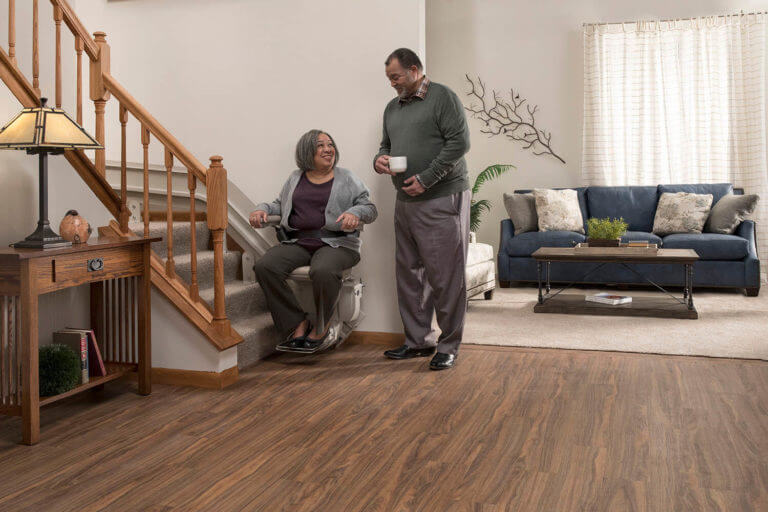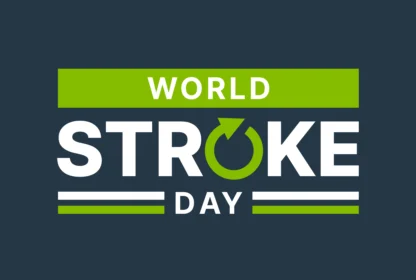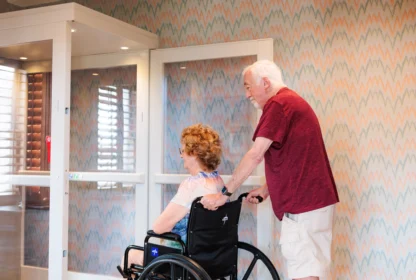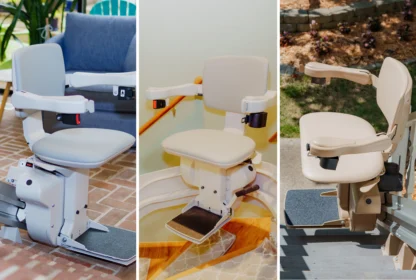Does Medicare Cover Stair Lifts? What You Need To Know About Stair Lift Funding

Stair Lifts & Medicare
When it comes to stair lifts (a.k.a. “chair lifts”), people don’t tend to argue over the benefits. Having a tough time taking the stairs? Use a stair lift to glide up or down with ease. Want to avoid a fall or injury? They can virtually eliminate any risk associated with your staircase.
That’s not the problem. What people have a harder time swallowing is the cost. A typical stair chair lift without medicare can cost anywhere from $3,000 to $5,000. If you have a curved staircase, you can expect to pay $10,000, or even higher!
For a lot of us, these prices are as steep as our staircase in the first place. We think, “Maybe I’ll settle for something cheaper online” or “I’ll just quit looking entirely.”
But cheaper isn’t necessarily better. Sure, you might save some money short-term; but if the equipment or installation is faulty you’ll end up paying for more servicing needs in the future. And if you give up the hunt altogether, you’re not doing yourself any good either.
But there’s good news! There are plenty of opportunities to find stair lift funding. The problem is knowing where to look. Here are a few helpful tips to find funding:
Does Medicare Cover Stair Lifts?
“Does medicare pay for stair lifts?” or “Can I get a free stair lift with medicare?”
This is the question that many people ask first. Unfortunately, Medicare does not cover the cost of stair lifts. Why? According to Accessible Home Cleveland, a stair lift isn’t considered to be “durable medical equipment” by Medicare. They consider it a “home modification” (which isn’t covered by their guidelines). Although many people tend to disagree with this classification, this is Medicare’s current standing on the issue. But don’t worry… There’s plenty of other funding opportunities ahead.
Does the VA Provide Stair Lift Funding?
If you served in the military, the Veteran’s Administration (VA) is definitely the first place you should go to inquire about stair lift funding. The VA has a few different options available to fund your “stair glide,” as they’re called by the organization.
“Is your disability a result of your military service?”
Your stair lift may be covered through VA healthcare. Simply undergo a home visit and skills evaluation test to have them possibly fund your stair lift. Get in touch with your local VA to discuss your options!
“Is your disability not related to military?”
If your condition isn’t related to your military service, you’ve still got funding opportunities (even if it’s for your spouse!). For one, there’s the VA Aid and Attendance Benefit. For more information on how to apply for this benefit, click here.
There’s also state programs called Veterans Directed Home and Community Based Services (VD-HCBS) that provide assistance for veterans who wish to remain living in their homes. For more information on this program and how to apply, click here.
“Interested in a grant?”
Grant opportunities can also assist you in paying for a stair lift. As a veteran, you might be qualified for a HISA Grant (Home Improvements and Structural Alterations), SHA Grant (Special Home Adaptation), or SAH Grant (Specially Adapted Housing). For more information on grant eligibility and how to apply,click here.
“Don’t know where your local VA is?”
For a full list of available locations and phone numbers,click here. You may also call 1-800-827-1000 toll-free to find the VA nearest you.
Can I get Stair Lift Funding Through State-Based Programs?
There are plenty of state-based programs that will provide assistance for a stair lift. The only problem is that eligibility varies for each program, so be sure to find out if you fall within the guidelines.
“Not sure where to begin searching for state-based programs?”
For a list of 34 programs offered in 22 states, click here. You can also ask around at your local Area Agency on Aging for tips on how to find funding for your stair lift.
Does Medicaid Cover Stair Lifts?
“Are you on Medicaid?”
Medicaid’s policies vary state by state, but it is common to find funding for a stair lift through Medicaid. According to PayingForSeniorCare.com, Medicaid will likely pay for the cost of a stair lift so long as it will “enable individuals to remain living in their homes and avoid nursing home placement.”
To apply for funding, you’ll have to fill out a Home and Community Based Services (HCBS) waiver. These waivers aim to help seniors remain in their homes by covering the cost of “home modifications,” such as stair lifts.
Not sure if your state’s Medicaid would qualify? For an extensive list of the HCBS waivers offered by each state, click here.
“In a nursing home but looking to move back home?”
A program called Money Follows the Person might be able to help. Currently active in 44 states (unavailable in FL, NM, UT, WY, AZ, AK), this program allows those on Medicaid the opportunity to move out of a nursing home and into the house of a family member. Occasionally, Money Follows the Person will allow for some type of home modification, such as stair lifts, to assist with the outfitting your new living space.
The official name of this program may vary by state, such as:
Whew, that sure is a lot of information! But hopefully these tips were able to help you along your stair lift buying journey. As soon as you’re able to find funding, 101 Mobility would love to provide a free at-home evaluation to determine the right product for your situation.
For even more information on frequently asked stair lift questions, visit our stair lift page, call us at (888) 258-0652, or shoot us an email!


